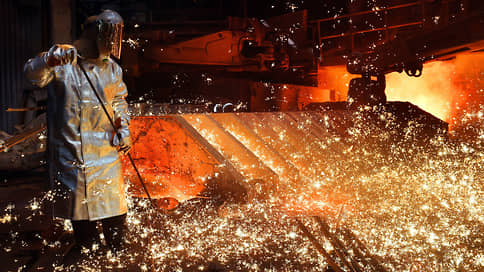A strong ruble is cast to the metal – Newspaper Kommersant No. 207 (7408) dated 11/09/2022
[ad_1]

The export of steel and iron ore is unprofitable for almost all Russian metallurgical companies, analysts at BCS Global Markets (BCS GM) believe, and the sector survives at the expense of the domestic market. Expensive logistics and a strong ruble lead to such a situation. BCS GM estimates that for Russian steel exports to China to break even, the ruble must weaken by 37%. Analysts say investors should look to coal stocks as coal prices remain high and exports were heavily oriented towards Asia even before the sanctions.
Exports of Russian steel and iron ore are currently unprofitable on average, while profitability in the domestic market is in positive territory and exceeds 30%, according to a survey by investment bank BCS Global Markets. According to analysts, only Vladimir Lisin’s NLMK shows a positive integrated export margin due to continued supplies of steel semi-finished products to the European market. EU sanctions completely prohibit the import of Russian rolled steel, however, slabs, although they were included in the eighth package of EU sanctions, are allowed to be imported until 2024 in the amount of 3.7 million tons annually.
In addition to sanctions, the profitability of steel and raw materials exports is negatively affected by the strengthening of the ruble and rising transport costs. Thus, according to BCS GM estimates, in order to break even in the segment of steel exports to China, the ruble exchange rate should be 37% weaker than now (85 rubles per dollar), and in the iron ore segment – by 16% (72 rubles per dollar) .
The largest Russian steel companies have stopped publishing interim financial results, which makes it difficult to assess the state of their business. It is unclear at this time whether the final financial statements for 2022 will be disclosed.
In 2021, Russian metallurgy produced 65.9 million tons of steel products, of which 28.3 million tons were exported. The draft strategy for the development of the metallurgical industry says that in 2022 exports will fall by 8% in the base scenario, by 13% in the conservative one. The EU sanctions measures affected the export of 3.9 million tons of finished metal products, 0.2 million tons of pipe products and 0.7 million tons of steel billets, which in value terms, taking into account the average export prices for these products in 2021, amounted to $3.7 billion, according to the document.
The Center for Economic Forecasting (CEP) of Gazprombank expects that the iron and steel industry around the world will operate with reduced profitability not only in 2022, but also in the first half of 2023. The state of the industry is negatively affected by high prices for coking coal, which is now actively supplied to power plants due to increased demand for coal-fired generation amid rising gas prices. According to CEP estimates, global demand for steel in 2022 will be at its lowest level in four years.
The problems of metallurgists force analysts to look at the sector with caution, giving preference to coal miners. This segment is relatively stable due to stable prices and initial focus on Asia. However, expensive logistics, the loss of markets due to sanctions and the strengthening of the ruble also have a negative impact on the profitability of coal companies. The REA Analytical Center of the Ministry of Energy in October estimated the volume of lost markets in Ukraine and Europe at 64 million tons per year, which is 30% of all Russian exports in 2021. According to the REA of the Ministry of Energy, coal production in 2022 will decrease by 9.5%, to 397 million tons under the inertial scenario, and by 4.1% under the optimistic scenario, to 421 million tons. Coal exports will decrease by 12.5%, to 195 million tons in the inertial scenario and by 8.9%, to 203 million tons in the optimistic scenario. Both scenarios assume an increase in exports to the Asia-Pacific region.
[ad_2]
Source link





